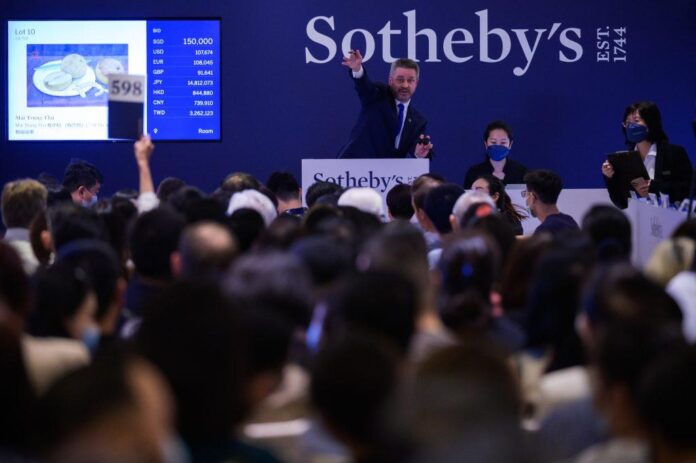Sotheby’s hoped to make an argument for Singapore’s future as an Asian art-market hub in its first live auction in the region in 15 years. The gambit seemed to pay off. On August 28, the sale generated SG$24.5 million ($18 million), handily exceeding expectations, which topped out at SG$18 million ($13 million).
Leading the charge was , an oil painting by Walter Spies, a Russian German artist who lived in Indonesia. It fetched SG$4 million ($2.9 million), surpassing its $2.5 million high estimate. (Final prices include auction-house fees; presale estimates do not.) Spies’s work rarely comes to market, with only 20 paintings put up for sale over the past 30 years.
“There was a palpable energy and excitement in the busy saleroom, which was matched by fierce bidding from across the globe,” Jasmine Prasetio, managing director of Sotheby’s Southeast Asia, said in a statement. “The result surpassed our expectations and underlines the potential for Singapore and the Southeast Asia region as a whole.”
Sotheby’s opened a Singapore office in 1995, and from 1996 to 2007 held biannual sales in the city-state. But aside from the occasional exhibition, the auction house’s Singapore business has been dormant in the years since as market attention turned to Hong Kong. Now, with strict lockdown restrictions and a looming property crash in mainland China and a crackdown on democratic freedoms in Hong Kong, art businesses are looking for new Asian footholds.

Walter Spies, Tierfabel (Animal Fable). Courtesy of Sotheby’s.
The total for the sale, announced in July, was higher than any of the previous Sotheby’s auctions held in Singapore, with only three of 50 lots left unsold, for a 94 percent sell-through rate. Almost half the lots sold for above estimate.
Bidders participated both in-person and online, and hailed from 20 different countries—and more than half were from Southeast Asia, reflecting the growing collector base in the region.

Willem Gerard Hofker, . Courtesy of Sotheby’s.
Big-ticket results included by Willem Gerard Hofker, which appeared on the market after more than 25 years in a private collection and nearly doubled expectations with a SG$2.3 million ($1.6 million) sale.
All eight works on offer by Vietnamese artist Le Pho sold—including the painting for SG$781,200 ($563,000)—for a combined total of SG$2.4 million ($1.7 million).

Le Pho, Vietnamese Lady (1938). Courtesy of Sotheby’s.
The one big miss on the day was by Chinese artist Zao Wou-Ki, which was bought in despite the third-highest presale estimate on the night, of SG$3.8 million to SG$4.8 million($2.7 million to $3.4 million).
The painting, which represents one of the artist’s first purely abstract compositions, last sold in 2019, at Sotheby’s Paris, for €2.17 million ($2.4 million), but failed to find a buyer this time around.

Zao Wou-Ki, . Courtesy of Sotheby’s.
Local Singapore artists had a strong showing, led by Georgette Chen, who was born in China and lived in Paris and New York before becoming a leading figure modern Singaporean art.
Her painting , a riverscape view of Singapore, was snapped up by a Southeast Asian collector for SG$2 million ($1.5 million). The fresh-to–the-market work broke Chen’s previous auction record of HK$10 million ($1.29 million), set in December at Christie’s Hong Kong.

Georgette Chen, Boats and Shophouses (1963-65). Courtesy of Sotheby’s.
A pair of works by Singaporean artist Chen Wen Hsi also found new homes. His oil on sand board painting, , fetched SG$176,400 ($126,614) topping a high estimate of SG$160,000 ($114,843). , an ink on paper drawing, sold for SG$94,500 ($67,829 USD), near the midpoint of the SG$70,000 to SG$120,000 estimate.
A bidding war for by Luxembourg painter Michel Majerus propelled the work to SG$1.1 million ($798,500)—more than triple its presale estimate and a new record for the artist.

Raghav Babbar, (2020). Courtesy of Sotheby’s.
Other highlights included the over seven-foot-wide canvas , by the late Indonesian artist Hendra Gunawan. The work smashed its SG $1.2 million ($868,370) high estimate, selling for SG$1.6 million ($1.2 million).
And 25-year-old Indian-born, Singapore-educated, London-based artist Raghav Babbar made quite the splash at his auction debut with the sale of for SG$441,000 ($318,000), an astonishing 11 times the presale high estimate of just SG$40,000 ($28,710).

























